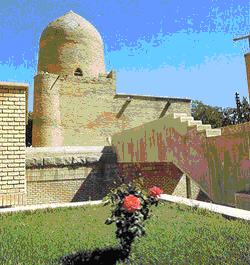There have been a few posts here on the blog about music, more specifically about the music many of us grew up with. Take it or leave it? OK for me but not for my kids. Can’t get it out of my head, etc.
My brother Chaim is a musician. Before he became observant he was, as they say, “living the life”. He was the lead singer for a West Coast band that had growing local popularity, was gaining radio play, and playing larger venues. After becoming observant he stayed away from his music as it reminded him of many of the things he wished to leave behind, mostly from a lifestyle point of view.
I would often chide him that Hashem didn’t give him his talents to be squelched but to be redirected, channeled.
After several years, he finally returned to his music with a deeper spiritual vibe. Here is, as he puts it, the artist named Chaim, formerly known as the artist named Jonny, and currently unknown with a beautiful song he wrote.

 Today I was speaking with a business associate who mentioned that his father was born and raised in Hamadan, Iran also known as Shush or Shushan HaBira–the setting for the Purim drama. Hamadan is located between Teheran and Iran’s western border with Iraq. He mentioned that his father is very proud of his birthplace–Hamadan literally means “place of knowledge” and its inhabitants were generally regarded as very intelligent. Interestingly, Hamadan was the first Iranian province to allow Jews to own property. He also mentioned that Esther and Mordechai are the most popular names for Jews born in Hamadan and he himself has numerous relatives bearing these names.
Today I was speaking with a business associate who mentioned that his father was born and raised in Hamadan, Iran also known as Shush or Shushan HaBira–the setting for the Purim drama. Hamadan is located between Teheran and Iran’s western border with Iraq. He mentioned that his father is very proud of his birthplace–Hamadan literally means “place of knowledge” and its inhabitants were generally regarded as very intelligent. Interestingly, Hamadan was the first Iranian province to allow Jews to own property. He also mentioned that Esther and Mordechai are the most popular names for Jews born in Hamadan and he himself has numerous relatives bearing these names.